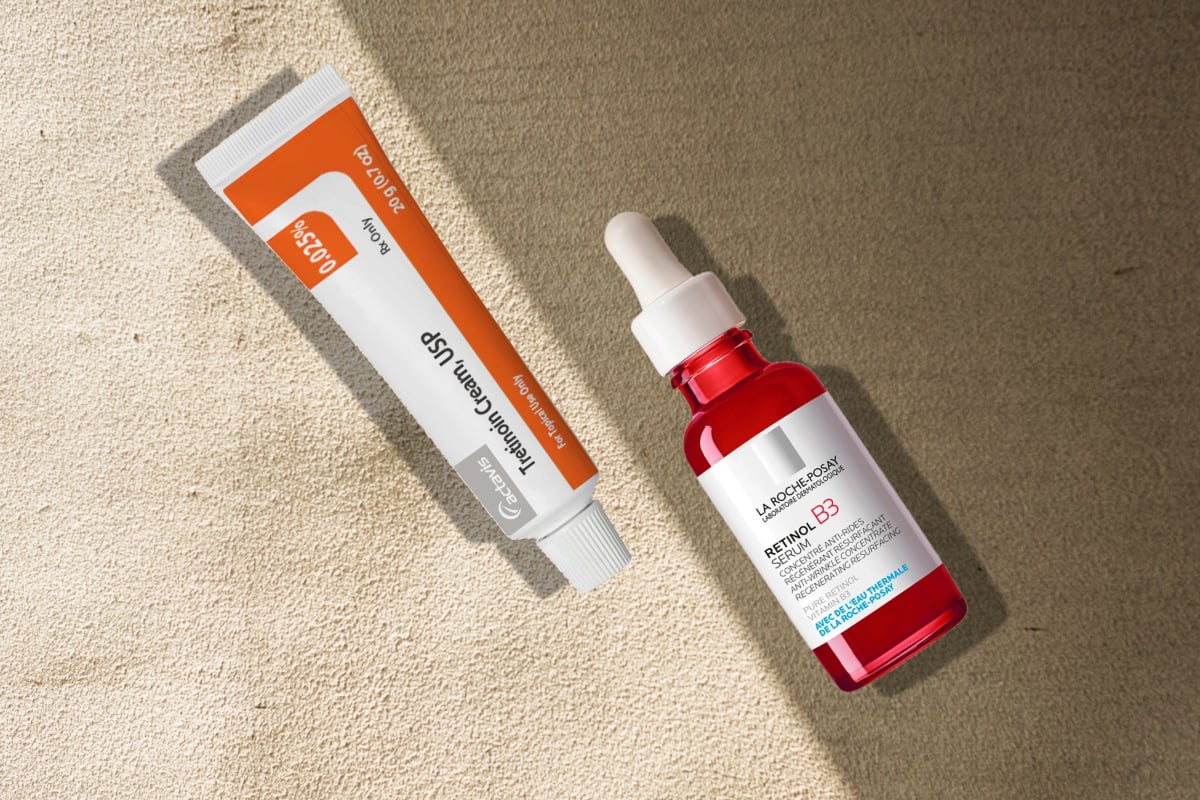Vitamin E is an antioxidant that protects your skin from sun damage, pollution, and other environmental stressors. But vitamin E can do much more for your skin. Read on to find out more.
What is vitamin E
Vitamin E is a fat-soluble vitamin, meaning it dissolves in oils and fats. It exists in several forms, but our bodies can only use one called alpha-tocopherol, which is also the form most often used in skincare formulations. While vitamin E boosts the immune system, it does have active benefits for the skin as well. As an antioxidant, it protects our skin from the damage caused by free radicals. Besides, vitamin E also strengthens the skin’s natural barrier, which helps prevent moisture loss and keeps skin hydrated.[2]
We should emphasize that our bodies cannot produce alpha-tocopherol on their own. We get it through our diet from foods like nuts, seeds, spinach, pumpkin, and avocado, or through supplements.[1] Once we consume vitamin E, it’s transported to the skin through sebaceous glands (the glands that produce our skin’s natural oils).
Is tocopherol the same as vitamin E?
Yes, whenever you see tocopherol or alpha-tocopherol on your skincare products, that’s vitamin E. The same goes if you spot tocopheryl acetate—it’s the most common form of vitamin E used in skincare that’s more stable and has a longer shelf life, though is more poorly absorbed by the skin.
Skincare benefits
Vitamin E is oil-soluble, meaning it dissolves easily in oils and fats. This is important for skincare because our skin naturally produces oils. When applied topically, vitamin E can easily mix with these oils and penetrate deeper into the skin’s layers. Here’s how this benefits your skin:
- Reduces sun damage and prevents premature skin aging: The sun’s rays can create harmful molecules called “free radicals” that damage our skin cells. Vitamin E is a natural antioxidant, so it can neutralize these free radicals and protect the skin from wrinkles and sunspots.[3] It’s a great addition to anti-aging routines.
- Softens skin: Vitamin E acts as an emollient. Emollients fill in tiny gaps on the surface of your skin, creating a smoother texture and trapping in moisture. This helps relieve dry patches, making your skin feel comfortable and soft. If your skin is feeling irritated, itchy, or rough, vitamin E can be a soothing solution.
- Reduces moisture loss: Our skin is constantly losing moisture, which can lead to dryness. Vitamin E helps solve this problem by strengthening your skin’s natural barrier. This keeps moisture locked in, making your skin feel hydrated.
Contrary to popular belief, topical vitamin E doesn’t speed wound healing or improve scars.[4] Instead, taking vitamin E orally, combined with vitamin C and zinc, has been shown to reduce wound healing time.[3]
Vitamin E side effects
Topical vitamin E is generally safe for all skin types, but some potential side effects can occur. The most common side effect is contact dermatitis, which can cause redness, itching, burning, or a rash where the vitamin E was applied.[3] This is more likely to happen if you use high concentrations of vitamin E. In rare cases, some people may experience a more severe allergic reaction, causing blisters or hives. Additionally, pure vitamin E oil can be slightly comedogenic, meaning it could clog pores for those prone to acne.
If you notice any bothersome side effects while using topical vitamin E, it’s important to stop using it and consult with a doctor or dermatologist.
How to use vitamin E
- Oils and serums: These deliver vitamin E deep into your skin for a big boost of antioxidant protection and softness.
- Creams: These work more on the surface, protecting your skin from pollutants and locking in moisture. In case your skin is sensitive, look out for ones with 0.5%-1% vitamin E for gentler benefits.
- Morning routine: Apply your vitamin E serum or cream in the morning to shield your skin from the day’s environmental stressors.
What else
- Studies found that using vitamin E with vitamin C is more effective against dark spots and sun damage. It even makes your sunscreen work better!
- For even more benefits, add ferulic acid to your vitamin E and C routine to double your protection against skin aging and sun damage.
- National Institutes for Health, Office of Dietary Supplements, Vitamin E
- Ekanayake-Mudiyanselage S, Thiele J. DieTalgdrüse als Transporter für Vitamin E [Sebaceous glands as transporters of vitamin E]. Hautarzt. 2006 Apr;57(4):291-6. German. doi: 10.1007/s00105-005-1090-7.
- Keen MA, Hassan I. Vitamin E in dermatology. Indian Dermatol Online J. 2016;7(4):311-315. doi:10.4103/2229-5178.185494
- Baumann LS, Spencer J. The effects of topical vitamin E on the cosmetic appearance of scars. Dermatol Surg. 1999 Apr;25(4):311-5. doi: 10.1046/j.1524-4725.1999.08223.x. PMID: 10417589.
- Oregon State Unversity, Vitamin E and Skin Health
- Darr D, Dunston S, Faust H, Pinnell S. Effectiveness of antioxidants (vitamin C and E) with and without sunscreens as topical photoprotectants. Acta Derm Venereol. 1996 Jul;76(4):264-8. doi: 10.2340/0001555576264268.
- Lin FH, Lin JY, Gupta RD, Tournas JA, Burch JA, Selim MA, Monteiro-Riviere NA, Grichnik JM, Zielinski J, Pinnell SR. Ferulic acid stabilizes a solution of vitamins C and E and doubles its photoprotection of skin. J Invest Dermatol. 2005 Oct;125(4):826-32. doi: 10.1111/j.0022-202X.2005.23768.x.




![Does resveratrol in red wine benefit your skin? While sipping on a glass of red wine can be a delightful experience, relying on it for skincare benefits is not the best idea. Sure, red wine contains a smidge of resveratrol, but let's put things into perspective. The concentration of resveratrol in red wine is relatively low. Red wines, specifically Pinot noir from France, typically contain 0.361-1.972 mg of resveratrol per liter.[8] To hit that reference dose of 500mg of resveratrol, you'd need to drink a lot of wine. We're talking about downing anywhere from 100 to 1000 glasses per day. It's a scene straight out of a wine lover's wildest dreams, but definitely not the healthiest approach. Resveratrol Benefits for Skin](https://womensconcepts.com/wp-content/uploads/2022/03/Resveratrol-Benefits-for-Skin.jpg)
